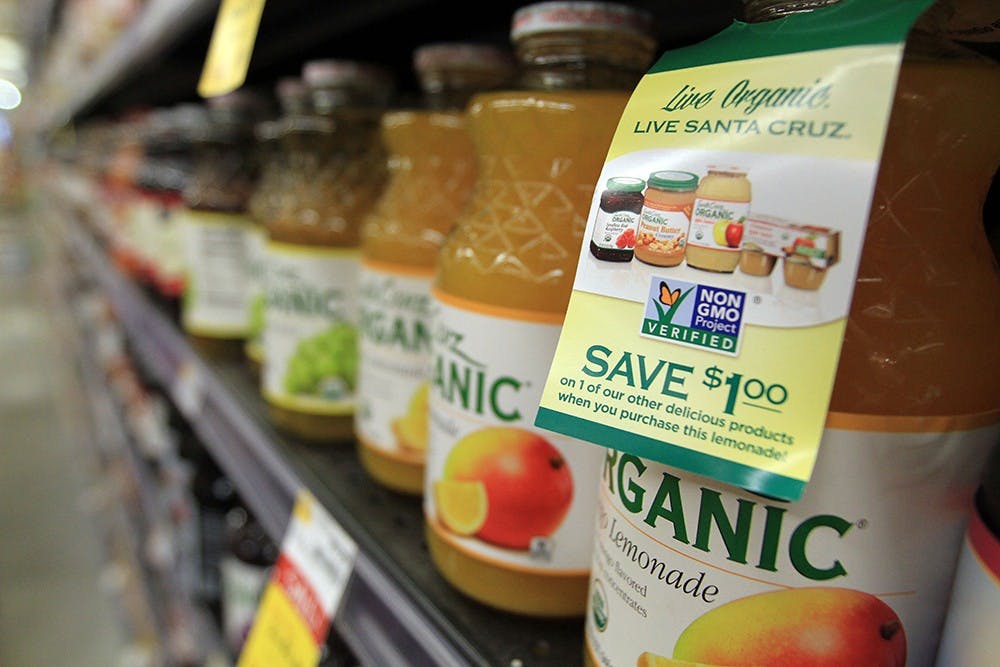Go into any grocery store, and you’ll see labels everywhere: on our produce, canned goods and meat. Read the labels closely, and you’ll read “fat free,” “low fat,” “sugar free,” “gluten free,” “superfood,” “organic,” “natural,” “cage free,” “grass fed,” “packed with antioxidants” and “cancer fighting.” The list goes on. Go online and search for healthy foods, and you’ll find dozens of articles making claims on how X can fight cancer or that Y will help you lose five pounds in one week.
We now know that our diet plays a huge deciding role on our health, so naturally we gravitate toward items that will promise to equip our bodies to fight against disease, help us lose weight or help us maintain our physical fitness. These labels are enticing.
But they also can be harmful. These kinds of labels belittle those who live with dietary restrictions (e.g. Celiac disease, gluten intolerance or diabetes), harm the reputation of science and promote a false and misinformed culture of nutrition and health.
There is no scientific evidence that blueberries prevent cancer or that coffee prevents Alzheimer’s disease. That’s not to say that eating blueberries or foods with antioxidants can’t help prevent cancer or Alzheimer’s. But cancer is a complex disease. You can do everything right and still have a high chance of being diagnosed with cancer.
Cancer is more than eating certain kinds of food. It can be a genetic condition (e.g. BRCA genes, breast cancer); it can be caused by viruses (e.g. HPV strains 16 and 18 causing cervical cancer); it can be influenced by your diet and/or environment (e.g. smoking can cause lung cancer).
Even though some studies show that these foods have impacted the participants’ health beneficially, the sample sizes were small, and the studies’ results did not show consistent results. Slapping these labels on packaging with promises like “experts/scientists claim” harms science by discrediting the scientific process of experimentation and analysis.
Food labels mislead you all the time -- and it's perfectly legal http://t.co/AUeQze9ES5 pic.twitter.com/uYaB6t270N
— MarketWatch (@MarketWatch) September 10, 2015
In addition, there is no need for gluten-free labels on foods that don’t even have gluten, like potato chips. We do not need to be eating gluten-free foods if we do not have a dietary restriction against gluten. While athletes claim going gluten-free have improved their performances, there is no scientific evidence that gluten-free diets contribute to weight loss or better health, and this notion contributes to the idea that gluten free is a fad diet.
"Go gluten free, and you’ll be healthy, fit and thin!" This kind of belief demeans those who have dietary restrictions against gluten, makes gluten-associated diseases almost a joke, and it harms our overall perception on nutrition and health.
We are promoting a false culture of nutrition and health that disregards the science behind these issues. These foods are not the only solutions to prevent disease. These labels will not magically solve all our health issues. Nutrition and health are very complex issues, and instead of looking for fast and quick answers, like one type of food or switching diets, it’s time we start thinking more holistically about how we approach these problems.
There is no one solution to fight these issues, and it harms us when we choose to believe these kinds of claims by creating a misinformed culture of health and nutrition.
Editor’s note: The opinions presented in this column are the author’s and do not imply any endorsement from The State Press or its editors.
Want to join the conversation? Send an email to opiniondesk.statepress@gmail.com. Keep letters under 300 words and be sure to include your university affiliation. Anonymity will not be granted.
Reach the columnist at gdkim@asu.edu or follow @grdkm on Twitter.
Like The State Press on Facebook and follow @statepress on Twitter.




